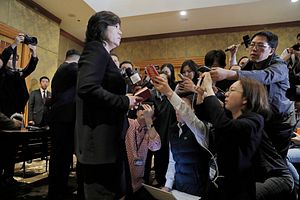According to South Korean media, at the First Session of the 14th Supreme People’s Assembly (SPA), Choe Son Hui replaced Kim Kye Gwan to become the first vice minister of foreign affairs and a member of the SPA diplomatic committee. Furthermore, like Ri Yong Ho, a member of the Central Political Bureau and the foreign minister, Choe was elected a member of the State Affairs Commission in April. Thus, she has also entered core policymaking circles. South Korean media claimed that Choe had been reporting directly to Kim Jong Un, bypassing Ri Yong Ho. Now she has even more justification to do so.
In 2010, Choe was tapped as deputy director of the Department of American Affairs of the North Korean Ministry of Foreign Affairs. Six years later, she became director of the same department, and her predecessor Han Song Ryol was promoted to the position of vice minister of foreign affairs. In 2018, tensions in the Korean Peninsula began to abate, and it seemed that Choe’s promotion was accelerated. In that year she became a vice minister of foreign affairs. Not long after, Han Song Ryol lost his post (and perhaps even his freedom); it is not clear whether his dismissal was related to Choe’s promotion. In 2019, Choe became the first vice minister of foreign affairs, and joined the State Affairs Commission. If Han had not been dismissed, he would have become the first vice minister of foreign affairs.
When Kim attended the two North Korea- U.S. summits held in Singapore and Hanoi, he was accompanied by Ri Yong Ho and Choe Son Hui, but not Kim Kye Gwan and Han Song Rol. Importantly, on May 7 and 8, 2018, when Kim visited China before the Singapore summit, Choe was also a member of his retinue.
On April 12, 2019, Kim Jong Un made a policy speech entitled “On Socialist Construction and the Internal and External Policies of the Government of the Republic at the Present Stage,” in which he highlighted the relationship between North Korea and the United States. He recognized that the sanctions against North Korea may last for a long time, and the relationship between North Korea and the U.S. cannot soon be improved. According to the Korean Central News Agency (KCNA), Kim stated, “We, of course, attach importance to the settlement of issues through dialogue and negotiations” but added that “In my opinion at this moment, it comes to my mind that there is no need for me to obsess over the summit talks with the United States out of thirst for the lifting of sanctions.” For the moment, although the prospects for North Korea-U.S. negotiations is uncertain and there are serious differences between the two parties, talks will not cease completely, and Choe can also play an important role in them.
Choe has been known to take a tough tone toward the U.S. For example, according to KCNA, on May 24, 2018, she attacked Vice President Mike Pence: “We could surmise more than enough what a political dummy he is as he is trying to compare the DPRK, a nuclear weapon state, to Libya that had simply installed a few items of equipment and fiddled around with them.” She even threatened the United States: “To borrow their words, we can also make the U.S. taste an appalling tragedy it has neither experienced nor even imagined up to now.” As for the North Korea-U.S. negotiations, she said, “We will neither beg the U.S. for dialogue nor take the trouble to persuade them if they do not want to sit together with us.”
On March 15 of this year, Choe also condemned U.S. Secretary of State Mike Pompeo and National Security Advisor John Bolton for having played negative roles during the second North Korea-U.S. summit in Hanoi, accusing them of creating an “atmosphere of hostility and mistrust” that thwarted the meeting. In this way, she blamed the no-deal outcome of the Hanoi summit on the United States, and in particular on Pompeo and Bolton.
From Kim Jong Un’s repeated promotions of Choe, up to his allowing her to join the State Affairs Commission, we can perceive that he trusts Choe very much. Furthermore, we can infer from this that North Korea’s attitude toward its nuclear programs is not likely to soften. Even though at certain times North Korea may tactically tone down its language to some extent, at other times its tone may be very tough — and Choe is willing to give some aggressive speeches on Kim’s behalf.
There’s a reason why Choe is trusted by Kim Jong-un, and it’s not only her diplomatic skills. According to South Korean media, Choe is former Prime Minister Choe Yong Rim’s stepdaughter. In China, where the top leadership is not hereditary, blood, marriage, and adoption relationships play important roles in the bureaucratic system. In North Korea, then, where the “bloodline of Mangyongdae” and “bloodline of Paektu” have been officially emphasized, nepotism is even more prevalent than it is in China. Some of the offspring of the privileged stratum have been promoted in the party’s system, some in the military system, and some in the diplomatic system, including Ri Yong Ho (his father, Ri Myong Je, was the former minister of the Organization and Guidance Department of the Workers’ Party of Korea) and Choe Son Hui. In fact, Choe’s rise can be considered a reflection of the reality of North Korean official circles.
Rongjie Lin (Henry R. Lin), Ph.D. in history, is an independent researcher and writer based in Toronto and Beijing.
A Chinese-language version of this article was published in Singapore’s Lianhe Zaobao newspaper on May 2, 2019.
































